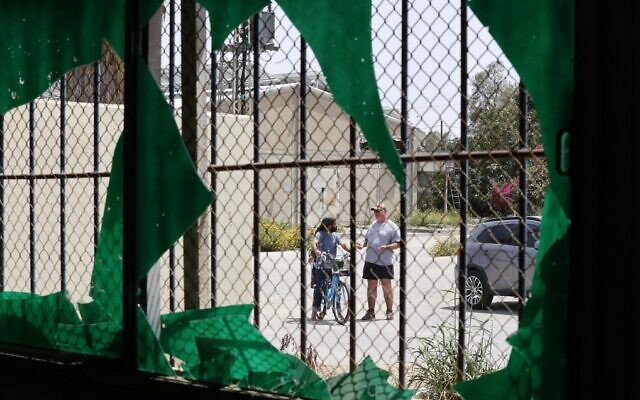Israel has reportedly sent a message to the Hamas terror group in the Gaza Strip, warning that if rocket fire from the enclave continues it will draw a major military response.
Over the past three nights, terrorists in the Strip fired some 45 rockets at southern Israel, causing damage in several Israeli communities near the border. In response, the Israel Defense Forces conducted a limited number of airstrikes on sites controlled by Hamas, which rules the enclave, and barred Palestinians from fishing off the Gaza coast.
Defense Minister Benny Gantz met Monday with the United Nations Special Coordinator for the Middle East Peace Process Tor Wennesland — a major intermediary between Israel and terror groups in the Gaza Strip — regarding the escalating violence from the Palestinian enclave, his office said.
“I expressed the urgency of the immediate cessation of violence from Gaza and reiterated Israel’s unyielding commitment to protecting its citizens and sovereignty,” Gantz said in a statement.

Screen capture from video of United Nations Special Coordinator for the Middle East Peace Process Tor Wennesland. (YouTube)
According to the Walla news site, diplomatic sources familiar with the developments said that Israeli officials asked Wennesland to send a clear message to Hamas and its rival the West Bank-based Palestinian Authority.
Wennesland was expected to travel later in the day to Cairo for talks with Egyptian Intelligence officials, who in the past have also mediated between Israel and Hamas. From there he will head to Amman, for meetings with Jordanian officials about the situation in Jerusalem, which has recently seen nightly clashes in the Old City between police and Palestinians.
Israeli officials explained to Wennesland that the closure of the Gaza fishing zone was the last attempt at a non-military response to the rocket fire, but that from now on Israel will use force to counter the attacks, the report said. The officials asked that Hamas be told that existing understandings for calm on the border are, from Israel’s point of view, still in place and that continued rocket fire will not be tolerated.
The Israeli officials also stressed that Israel will not allow itself to be dragged into any internal Palestinian disputes against the backdrop of an expected delay in Palestinian elections that had been scheduled for May 22, according to the report.
Israel’s security cabinet was meeting Monday afternoon to discuss steps in response to the escalation on the Gaza front as well as in East Jerusalem.
Earlier Monday Hamas reacted furiously to Israel’s full closure of the Gaza fishing zone, saying it would not accept the restrictions and that the policy would have serious repercussions.
“Israel will bear the consequences,” Hamas said, according to the Ynet news site. “The closure of the Gaza Strip to fishermen is a blatant violation of their rights and constitutes a form of ongoing aggression against our people. Israel’s aggressive policy toward the Palestinian people will not break its steadfast spirit or weaken its fist or limit its determination.
“We will not accept restrictive measures and pressure on the Palestinian people, and Israel will bear the consequences of its aggressive behavior,” the terror group said.
The size of Gaza’s fishing zone has varied, with Israel raising and lowering the limit in recent years in a bid to pressure Hamas. Fishing is a significant source of revenue for the enclave.

View of fishing boats at the port of Gaza City, June 13, 2019. (Hassan Jedi/Flash90)
Hamas sources were quoted Monday by Lebanese daily Al-Akhbar, widely considered a mouthpiece for the terror group Hezbollah, as saying that mediators from Egypt and the United Nations had been told Hamas opposes a truce with Israel for as long as Israeli policy against the Palestinians continued in Jerusalem, and that the potential cancellation of the May 22 Palestinian Authority elections would lead to an escalation of violence in Jerusalem, the West Bank and Gaza.
The Palestinians are seen as likely to delay their first national elections in 15 years, citing Israel’s decision to bar East Jerusalemites from voting where they reside. Israel views East Jerusalem as part of its undivided capital and forbids any PA activity there, while the Palestinians want East Jerusalem as the capital of a future state.
Palestinian terror groups have said that the rocket attacks over the past few days were in response to ongoing unrest in Jerusalem, where Arab residents have demonstrated for several days against Ramadan restrictions on congregating near Jerusalem’s Damascus Gate. Those restrictions were lifted by police on Sunday evening.

Israeli police and Palestinian men gather in a plaza outside of Jerusalem’s Old City, April 25, 2021 (AP Photo/Ariel Schalit)
Terrorists in the Strip launched five rockets toward southern Israel overnight. It was the third straight night of rocket attacks from Gaza, raising the specter of wider conflict in the restive region and between Israel and Palestinians in general.
The closure of the fishing zone appeared to be Israel’s sole retaliation to the rocket attacks, with the IDF refraining from conducting airstrikes on the Hamas terror group in the Strip — its usual response to rocket fire.
Sunday night’s launches began at 10:45 p.m., with a rocket that struck an open field near the Gaza border, without triggering alarms in populated areas. Roughly an hour later, a second rocket was fired toward southern Israel, but it failed to clear the border and landed inside the Strip, according to the army.

Rockets are fired toward the sea during a military drill by members of the Mujahideen Brigades, the armed wing of the Palestinian movement of the same name, along a beach off of Gaza City, on April 24, 2021. (Photo by MAHMUD HAMS / AFP)
Shortly after 3 a.m., terrorists in Gaza launched three rockets toward the town of Sderot and the surrounding area, triggering sirens in the communities. Two of the rockets were intercepted by the Iron Dome missile defense system; the third landed inside Gaza, the IDF said.
Four people, including a pregnant woman, were lightly injured after falling while running to bomb shelters in that attack, medics said.
The attacks on Sunday night and Monday morning came after Gazan terrorist groups launched over 40 rockets into Israel over the weekend. Also on Saturday, a number of Palestinian terror groups fired experimental rockets toward the Mediterranean Sea as a show of force.
Two Gaza factions, the Popular Front for the Liberation of Palestine and a branch of Fatah’s Al-Aqsa Martyrs’ Brigades, claimed responsibility for the Friday-Saturday rocket fire. But Israel holds Hamas directly responsible for all fire from the enclave into Israeli territory, charging that it takes place with the terror group’s consent.

Men stand in front of a building baring traces of rockets fired from the Gaza Strip, in the kibbutz Kissufim in southern Israel, adjacent to the Palestinian enclave, on April 24, 2021 (JACK GUEZ / AFP)
The Hamas leadership earlier Sunday called East Jerusalemites to continue “mobilizing in the Old City and at its gates.” Hamas also said night patrols of Palestinians ought to be formed to protect East Jerusalem residents from assaults by Jewish extremists.
The widening circle of clashes has sparked concerns in Israel that the situation could escalate across the West Bank and Gaza.
Prime Minister Benjamin Netanyahu called Saturday for the military to “prepare for any scenario” with Gaza. Gantz similarly said that the IDF “will do what is necessary so the calm is preserved,” following security consultations at defense headquarters in Tel Aviv.
Judah Ari Gross contributed to this report.
Related posts:
Views: 0
 RSS Feed
RSS Feed

















 April 26th, 2021
April 26th, 2021  FAKE NEWS for the Zionist agenda
FAKE NEWS for the Zionist agenda  Posted in
Posted in  Tags:
Tags: 
















